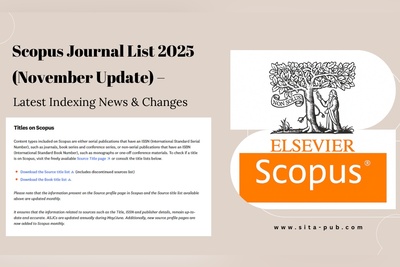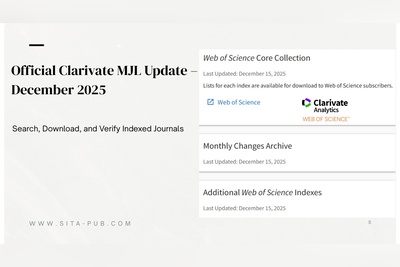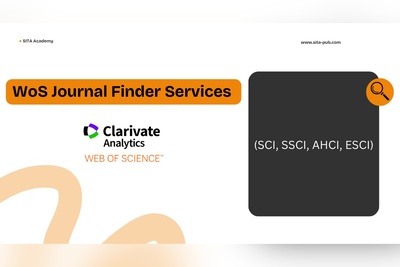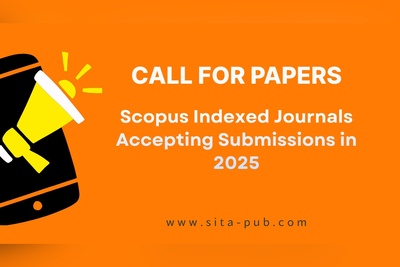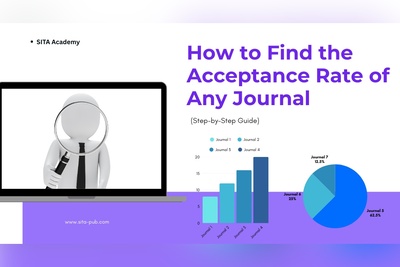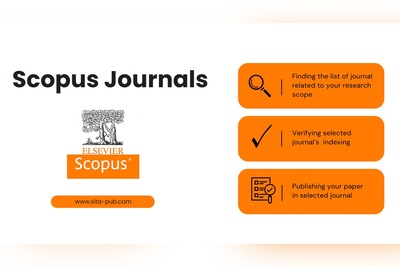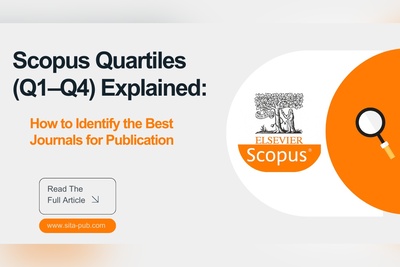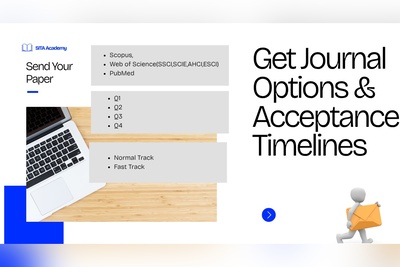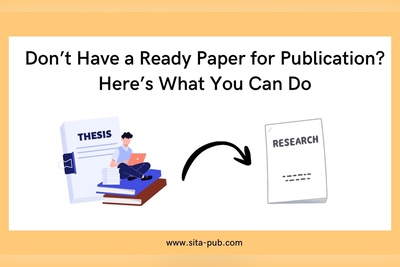How to Publish in Web of Science (WoS) Indexed Journals – A Complete Step-by-Step Guide (2025)
Learn how to publish in Web of Science (WoS) journals step-by-step. Understand SCIE, SSCI, AHCI, ESCI indexing, journal selection, formatting, submission, and acceptance tips.
- What Are Web of Science (WoS) Indexed Journals?
- Step 1: Have a Ready Research Paper
- Step 2: Select the Right Web of Science Journal
- Step 3: Prepare Your Paper for Submission
- Step 4: Submit the Paper to the Journal
- Step 5: Monitor Review Progress
- Step 6: Acceptance and Publication
- Web of Science Journal Selection & Publication Support at SITA Academy
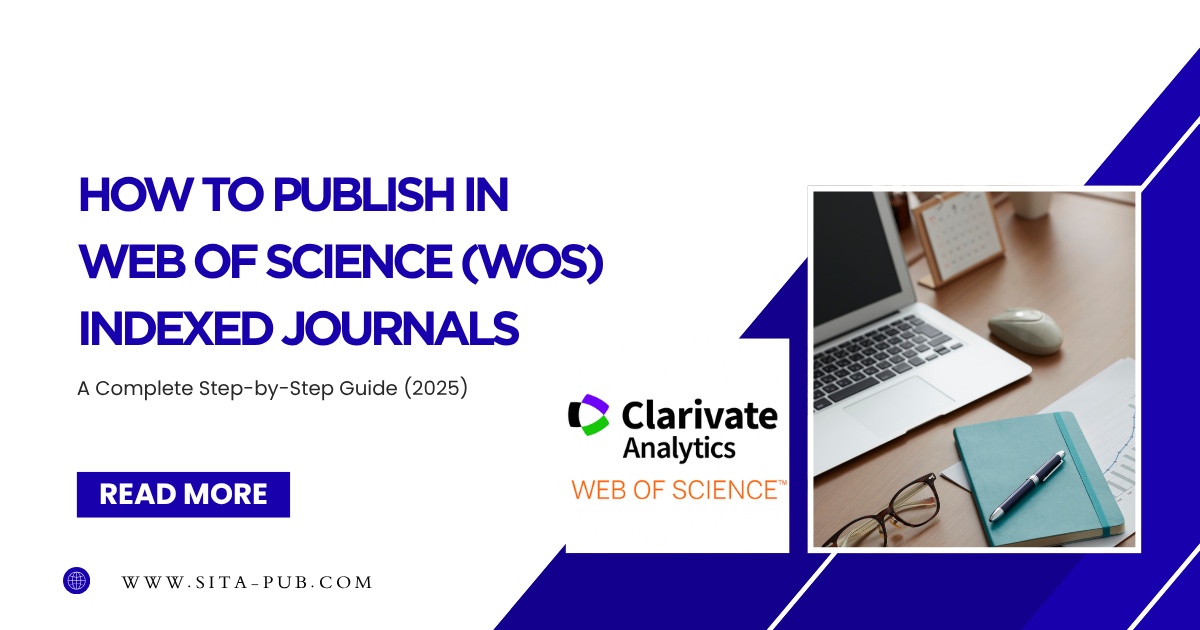
Publishing in a Web of Science (WoS) indexed journal is one of the most important academic achievements for researchers, graduate students, and professionals seeking global recognition. Whether you need a publication for graduation, academic promotion, research evaluation, scholarships, or CV enhancement, WoS journals provide high credibility and international visibility.
But the publication process is not as simple as uploading your paper and waiting for acceptance. It requires proper preparation, correct journal targeting, strong academic writing, and careful compliance with journal requirements.
In this detailed guide, we will walk you step-by-step through how to publish in Web of Science indexed journals, explain what WoS indexing means, and show you how SITA Academy can support you at every stage—from journal selection to final publication.
What Are Web of Science (WoS) Indexed Journals?
Web of Science is one of the most prestigious journal indexing platforms in the world, managed by Clarivate Analytics. Journals indexed in WoS go through strict evaluation based on:
Editorial quality
Peer-review process
Research ethics
Publication standards
International diversity
Citation impact
Because of this strong evaluation, publications in WoS journals carry significant academic weight.

Types of WoS Indexing (Important to Know!)
Web of Science Core Collection includes several categories. Understanding them helps you choose the correct journal:
Science Citation Index Expanded (SCIE)
The most prestigious WoS category
Covers high-impact scientific journals
Journals usually have Impact Factor (IF)
Social Sciences Citation Index (SSCI)
High-quality journals in social sciences
Also includes journals with Impact Factor
Arts & Humanities Citation Index (AHCI)
Covers journals in humanities, arts, literature, philosophy, etc.
Does not have Impact Factor
Emerging Sources Citation Index (ESCI)
Quality journals under evaluation for SCI/SSCI/AHCI
Indexed in WoS and acceptable for most academic requirements
Usually faster and easier to publish in
Conference Proceedings Citation Index (CPCI)
For high-quality conference papers
Less common for academic promotions
Step 1: Have a Ready Research Paper
To publish in a WoS-indexed journal, you must start with a proper academic paper. This can be:
A standalone research paper you wrote independently, or
A publishable research paper extracted from your Master's or PhD thesis
Many students mistakenly assume that a thesis can be sent directly to a journal.
This is not true.
Why a thesis cannot be published directly:
Contains 100+ pages
Includes excessive details
Not structured like a research article
Not written in journal format
Sometimes contains unpublished raw data
Must be rewritten in concise academic style
Extracting a paper from a thesis involves:
Selecting one main idea or contribution
Summarizing methodology
Shortening literature review
Presenting only essential results
Writing a journal-ready structure
At SITA Academy, our academic editors can evaluate your thesis and tell you how many publishable papers can be extracted from it.
Step 2: Select the Right Web of Science Journal
Selecting an appropriate journal is the most critical step in increasing your chances of acceptance.
A suitable WoS journal must match:
Your research field
Your methodology
Your paper length
Your academic goals
Your publication deadline
Many papers get rejected simply because the authors selected the wrong journal.
What to Consider When Selecting a WoS Journal
Below are the most important factors:
1. Journal Indexing Level
Choose based on your requirement:
Requirement | Recommended Index |
Promotion | SCIE / SSCI |
Graduation | SCIE / SSCI / ESCI |
Fast publication | ESCI |
CV enhancement | Any WoS Core Collection |
2. Impact Factor
The Impact Factor (IF) measures how often a journal is cited.
High IF (top-tier journals) → very competitive
Moderate IF → balanced difficulty
ESCI → no IF but fast acceptance
3. Publication Timeline
Each journal has different timelines:
Stage | Typical Duration |
Editorial screening | 1–4 weeks |
Peer review | 4–12 weeks |
Revisions | 2–6 weeks |
Final decision | 1–4 weeks |
Publication online | 2–6 weeks |
Some journals offer fast-track publication.
4. Publication Fees
WoS journals vary:
Type | Fee Range |
Traditional (no APC) | Free |
Hybrid journals | Optional fees |
Open Access (OA) | $300 – $3,500+ |
At SITA Academy, we provide you with:
Fee details
Whether the journal is free or paid
Official journal website
ISSN
Publication speed
Acceptance probability
Comparing Journals: A Practical Table
Below is a sample comparison used in professional journal selection:
Journal | Indexing | IFC | Fee | Avg. Review Time | Acceptance Rate |
Journal A | SCIE | 3.2 | Free | 8–12 weeks | Low |
Journal B | SSCI | 2.1 | $1200 | 6–10 weeks | Medium |
Journal C | ESCI | – | $600 | 3–6 weeks | High |
Such analysis helps researchers choose correctly.
Step 3: Prepare Your Paper for Submission
After selecting the journal, your paper must be prepared according to strict guidelines.
Requirements include:
1. Plagiarism Check
WoS journals usually require plagiarism below 10–15%
Use Turnitin or iThenticate
2. Academic Editing
Your paper should be:
Grammatically correct
Scientifically clear
Written in academic English
Free of ambiguity
3. Formatting According to Journal Guidelines
Every journal has different rules for:
Font
Spacing
Abstract length
Reference style (APA, MLA, IEEE, Chicago…)
Figure and table formatting
Number of words
Manuscript structure
Improper formatting often causes immediate desk rejection.
At SITA Academy, our team formats your paper exactly to journal specifications.
Step 4: Submit the Paper to the Journal
You will need to create an account on the journal’s submission system such as:
Editorial Manager
ScholarOne
Elsevier EVISE
Manuscript Central
Submission Documents Typically Include:
Manuscript file
Cover letter
Highlights (if required)
Figures and tables
Ethical statement
Conflict of interest declaration
ORCID ID (optional but recommended)
Step 5: Monitor Review Progress
After submission, your paper goes through:
1. Editorial Screening
Checks for:
Scope
Formatting
Plagiarism
Ethical compliance
2. Peer Review
Usually involves two or more expert reviewers.
3. Revision Phase
You may receive:
Minor revisions
Major revisions
Conditional acceptance
Rejection
Responding thoroughly and professionally increases your chances of acceptance.
Step 6: Acceptance and Publication
When your paper is accepted, the journal will provide:
Acceptance letter
PDF proofs for final corrections
Online publication link
DOI number
Indexing in Web of Science (usually within weeks)
Congratulations — you have successfully published in a WoS-indexed journal.
Web of Science Journal Selection & Publication Support at SITA Academy
Publishing in WoS journals can be challenging.
But with the right support, it becomes a smooth and strategic process.
At SITA Academy, we provide:
FREE evaluation of your paper or thesis
Extraction of publishable papers from your thesis
Personalized WoS journal recommendations (SCIE, SSCI, AHCI, ESCI)
Journal comparison (fees, IF, speed, acceptance rate)
Professional editing and proofreading
Formatting according to journal requirements
Guidance through submission systems
Full monitoring until acceptance
We also help you choose journals suitable for:
Graduation requirements
Academic promotions
CV improvement
Professional recognition
University-specific guidelines
Start Your WoS Publication Today
If you want to publish your research in a reputable Web of Science journal quickly and safely, contact the SITA Academy team.
Send your abstract or full paper
We will evaluate it for FREE
You will receive a personalized WoS journal list
Verified Contact Channels
If you have any questions, inquiries, or would like to learn more about our services, please don't hesitate to reach out to us. Our dedicated team is ready to assist you.





